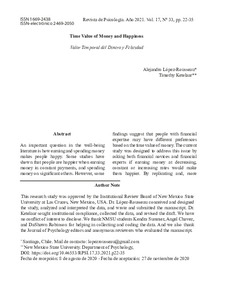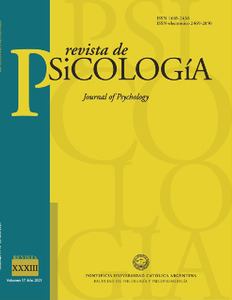Por favor, use este identificador para citar o enlazar este ítem:
https://repositorio.uca.edu.ar/handle/123456789/11604| Título: | Time value of money and happiness Valor temporal del dinero y felicidad |
Autor: | López-Rousseau, Alejandro Ketelaar, Timothy |
Palabras clave: | DINERO; BIENESTAR; FELICIDAD | Fecha de publicación: | 2021 | Editorial: | Pontificia Universidad Católica Argentina. Facultad de Psicología y Piscopedagogía | Cita: | López-Rousseau, A., Ketelaar, T. Time value of money and happiness [en línea]. Revista de Piscología. 2021,17 (33). Disponible en: https://repositorio.uca.edu.ar/handle/123456789/11604 | Resumen: | Abstract: An important question in the well-being literature is how earning and spending money makes people happy. Some studies have shown that people are happier when earning money in constant payments, and spending money on significant others. However, some findings suggest that people with financial expertise may have different preferences based on the time value of money. The current study was designed to address this issue by asking both financial novices and financial experts if earning money at decreasing, constant or increasing rates would make them happier. By replicating and, more importantly, disambiguating previous
findings, the results suggest that financial
novices are happier when earning money in
constant payments and spending money on
debts, whereas financial experts are happier
when earning money in decreasing payments
and spending money on investments. These
findings suggest that earning and spending
money makes people happier in different
ways depending on their financial expertise. Resumen: Una cuestión importante en la literatura sobre el bienestar es cómo ganar y gastar dinero hace feliz a la gente. Algunos estudios han demostrado que la gente es más feliz cuando gana dinero en pagos constantes y gasta dinero en personas significativas. Sin embargo, algunos hallazgos sugieren que la gente con experticia financiera puede tener diferentes preferencias basadas en el valor temporal del dinero. El estudio actual fue diseñado para abordar este asunto preguntando tanto a novatos financieros como a expertos financieros si ganar dinero a tasas decrecientes, constantes o crecientes los haría más felices. Al replicar y, más importante todavía, desambiguar hallazgos anteriores, los resultados sugieren que los novatos financieros son más felices cuando ganan dinero en pagos constantes y gastan dinero en deudas, mientras que los expertos financieros son más felices cuando ganan dinero en pagos decrecientes y gastan dinero en inversiones. Estos hallazgos sugieren que ganar y gastar dinero hace que la gente sea más feliz de diferentes maneras dependiendo de su experticia financiera. |
URI: | https://repositorio.uca.edu.ar/handle/123456789/11604 | ISSN: | 1669-2438 2469-2050 (online) |
Disciplina: | PSICOLOGIA | DOI: | https://doi.org/10.46553/RPSI.17.33.2021.p22-35 | Derechos: | Acceso abierto | Fuente: | Revista de Piscología Vol.17, No. 33, 2021 |
| Aparece en las colecciones: | RdP - 2021 Vol. 17 nro. 33 |
Ficheros en este ítem:
| Fichero | Descripción | Tamaño | Formato | |
|---|---|---|---|---|
| valor-temporal-dinero-felicidad.pdf | 1,04 MB | Adobe PDF |  Visualizar/Abrir | |
| cover_issue_349_es_AR.png | 123,81 kB | image/png |  Visualizar/Abrir |
Visualizaciones de página(s)
305
comprobado en 30-abr-2024
Descarga(s)
235
comprobado en 30-abr-2024
Google ScholarTM
Ver en Google Scholar
Altmetric
Altmetric
Este ítem está sujeto a una Licencia Creative Commons

